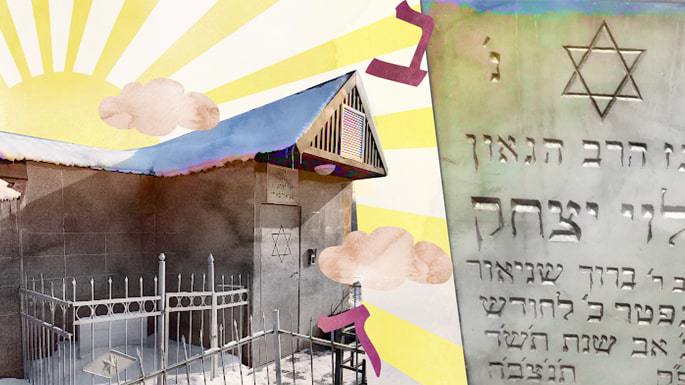A Visit to R’ Levi Yitzchak’s Resting Place
When my massage therapist, Vera, mentioned that she and her husband, Mark, would be flying to Almaty, Kazakhstan, for a family engagement, I asked her to visit the resting place of Rabbi Levi Yitzchak Schneerson, the Rebbe’s father.
R’ Levi Yitzchak fearlessly served as chief rabbi of what is now Dnipro, Ukraine, until his arrest in 1939. For a year, he was jailed, interrogated and tortured in Stalin’s notorious prisons before being sentenced to brutal exile in Kazakhstan.
Even in exile, while living in extreme poverty and discomfort, he and his wife, Rebbetzin Chana—who joined her husband in the remote village of Chi’ili, to which he’d been sent—became beacons of hope for the many refugees who ended up in the Kazakhstan region during World War II. With meager resources at their disposal and facing a constant threat to their very lives, Rabbi Levi Yitzchak and Rebbetzin Chana heroically reached out to their brethren in need, helping both materially and spiritually.
In the last few months of his life, Rabbi Levi Yitzchak and Rebbetzin Chana were granted permission to relocate to Almaty, then known as Alma-Ata, where there was some semblance of a Jewish community. But by then Rabbi Levi Yitzchak was already terminally ill, and in the summer of 1944 he tragically passed away. He is buried in Almaty.
I’d learned that Judaism views the resting places of the righteous with much reverence and respect, and considers it propitious to pray there. I therefore felt that having Vera visit the gravesite would offer a unique opportunity to honor the tzadik and connect with his soul.
Both Vera and Mark immigrated to the United States from Tashkent, a city in Uzbekistan, which was known as a relatively safe haven for religious Jews during the Soviet era.
Far from the center of Soviet ideology, Uzbekistan’s mostly Muslim residents were able to uphold their faith and religious practice. Unlike the more centralized Soviet republics, atheism wasn’t embraced there, and people of all religious backgrounds were welcomed and respected. Jews in Uzbekistan were proud of their heritage, and for his 16th birthday, Mark received a necklace with a Star of David.
When I asked Mark about his childhood memories, he shared that his grandparents openly spoke Yiddish to each other and didn’t hide their Jewish heritage. Along with Soviet and Muslim holidays, his family celebrated Jewish milestones—something very uncommon in the rest of the Soviet Union.
When Mark was only 21, his mother, Ada, passed away after a long battle with cancer. Although he didn’t receive any spiritual guidance during that painful time, Mark intrinsically felt that he remained connected to his mother’s soul.
In 2001, Mark and his father immigrated to the United States, where Mark studied electrical engineering, and subsequently met and married Vera. When Vera suggested to her husband that they pay their respects at Rabbi Levi Yitzchak’s resting place during their trip to Kazakhstan, Mark readily agreed.
Their visit took place in the summer of 2014, a time when they were experiencing difficulties trying to start a family.
“I think that perhaps this was the first time in my life that I really prayed,” recalled Mark. “Sofya told my wife about the gravesite of the Rebbe’s father, right in Almaty, where we were headed. We decided to go there to pray for our needs. A local Chabad rabbi greeted us and offered me the opportunity to put on tefillin. I wore a kippah and repeated a Hebrew prayer after him. I felt a strong energy in that place and believed our prayers were heard.”
Soon after, the couple welcomed a daughter, whom they named after Mark’s mom, Ada.
From Uzbekistan to Kazakhstan – A Visit to R’ Levi Yitzchak’s Resting Place – Chabad.org

